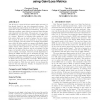412 search results - page 79 / 83 » Utility maximization in peer-to-peer systems |
ISCA
2008
IEEE
14 years 4 months ago
2008
IEEE
A high-concurrency transactional memory (TM) implementation needs to track concurrent accesses, buffer speculative updates, and manage conflicts. We present a system, FlexTM (FLE...
MM
1997
ACM
14 years 2 months ago
1997
ACM
A number of recent technological trends have made data intensive applications such as continuous media (audio and video) servers a reality. These servers store and retrieve a larg...
ATAL
2006
Springer
14 years 1 months ago
2006
Springer
In many Multi-Agent Systems (MAS), agents (even if selfinterested) need to cooperate in order to maximize their own utilities. Most of the multi-agent learning algorithms focus on...
RSS
2007
13 years 11 months ago
2007
— Multi-robot systems require efficient and accurate planning in order to perform mission-critical tasks. However, algorithms that find the optimal solution are usually computa...
GIS
2004
ACM
14 years 10 months ago
2004
ACM
The R*-tree is a state-of-the-art spatial index structure. It has already found its way into commercial systems. The most important improvement of the R*-tree over the original R-...

